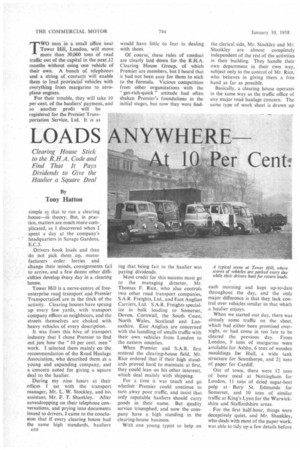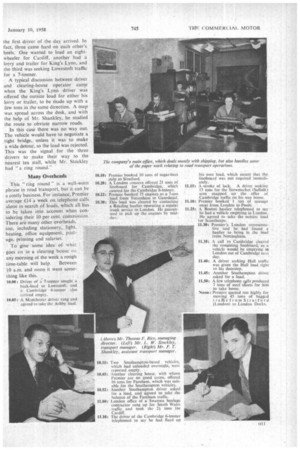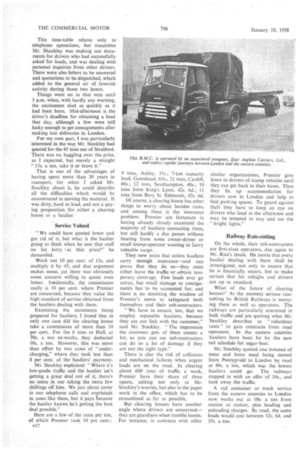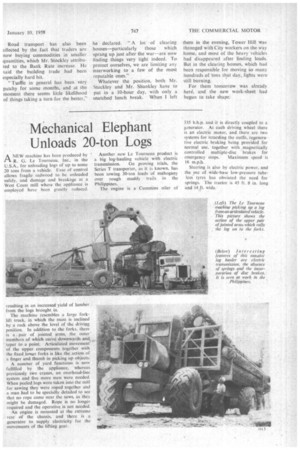LOADS ANYWHERE
Page 50

Page 51

Page 52

Page 53

If you've noticed an error in this article please click here to report it so we can fix it.
Clearing House Stick to the R.H.A. Code and Find That It Pays Dividends to Give the Haulier a Square Deal
By
Tony Hatton
TWO men in a small office near Tower Hill, London, will move more than 30,000 tons of road traffic out of the capital in the next 12 months without using one vehicle of their own. A bunch of telephones and a string of contacts will enable them to load provincial vehicles with everything from margarine to aeroplane engines.
For their trouble, they will take 10 per cent. of the hauliers' payment, and so another profit will be registered for the Premier Transportation Service, Ltd. It is as simple az that to run a clearing house—in theory. But, in practice, matters are much more com-, plicated, as I discovered when I spent a day at the company's headquarters in Savage Gardens, E.C.3.
. Drivers book loads and then 'do not pick them up, manuL facturers order lorries and change their minds, consignments fail to arrive,. and a few dozen other difficulties develop every day in a clearing house.
Tower Hill is a nerve-centre of freeenterprise road transport and Premier Transportation are in the thick of the activity. Clearing houses have sprung up every few yards, with transport company offices as neighbours, and the streets themselves are choked with heavy vehicles of every description.
It was from this hive of transport industry that I chose Premier to find out just how the • " 10 per cent men " work. I selected them mainly on the recommendation of the Road Haulage Association, who described them ifs a young and expanding company, and a concern noted for giving a square deal to the haulier.
During my nine hours at their offices I sat with the transport manager, Mr. L. W. Stockley, and his assistant, Mr. F. T. Shankley. After eavesdropping on their telephone conversations, and prying into documents issued to drivers, I came to the Conclusion that if every clearing house had the same high standards. hauliers D10 would have little to fear in dealing with them.
Of course, these rules of conduct are clearly laid down for the R.H.A. Clearing House Group, of which Premier are members, but I heard that it had not been easy for them to stick to the formula. Vicious competition from other organizations with the
get-rich-quick" attitude had often shaken Premier's foundations in the initial stages, but now they were find
ing that being fair to the haulier was paying dividends.
Most credit for this success must go to the managing director, Mr. Thomas F. Rice, who also controls two other road transport companies, S.A.R. Freights, Ltd., and East Anglian Carriers, Ltd. S.A.R. Freights specialize in bulk loading to Somerset, Devon, Cornwall, the South Coast, North Wales, Scotland and Lancashire, East Anglian are concerned with the handling of smalls traffic with their own vehicles from London to the eastern counties.
When Premier and S.A.R. first entered the clearing-house field, Mr. Rice ordered that if their high standards proved hard to maintain at first, they could lean on his other interests, which deal mainly with shipping.
For a time it was touch and go whether Premier could continue to turn away poor traffic, and insist that only reputable hauliers should carry goods in their name. But quality service triumphed, and now the company have a high standing in the clearing-house business.
With one young typist to help on the clerical side, Mr. Stockley and Mr. Shankley are almost completely independent of the rest of the activities in their building. They handle their own department in their own way, subject only to the control of Mr. Rice, who believes in giving them a free hand as far as possible.
Basically, a clearing house operates in the same way as the traffic office of any major road haulage concern. The same type of work sheet is drawn up each morning and kept up-to-date throughout the day, and the only major difference is that they lack control over vehicles similar to that which a haulier enjoys.
When we started our day, there was already some traffic on the sheet, which had either been promised overnight, or had come in too late to be cleared the previous day. From London, 9 tons of margarine were available for Ashby, 6 tons of wooden mouldings for Hull, a wide tank structure for Scunthorpe, and 2+ tons of paper for Cardiff.
Out of town, there were 12 tons of bone meal at Nottingham for London, 11 tons of dried sugar-beet pulp at Bury St. Edmunds • for Somerset, and 10 tons of similar traffic at King's Lynn for the Warwickshire and Staffordshire areas.
For the first half-hour, things were deceptively quiet, and Mr. Shankley, who deals with most of the paper work, was able to tidy up a few details before the first driver of the day arrived. In fact, three came hard on each other's heels. One wanted to load an eightwheeler for Cardiff, another had a lorry and trailer for King's Lynn, and the third was seeking Lowestoft traffic for a 7-tonner.
A typical discussion between driver and clearing-house operator carne when the King's Lynn driver was offered the outsize load for either his lorry or trailer, to be Made up with a few tons in the same direction. A map was spread across the desk, and with the help of Mr. Shankley, he studied the route to obviate narrow roads.
in this case there was no way out. The vehicle would have to negotiate a tight bridge, unless it was to make a wide detour, so the load was rejected. This was the signal for the three drivers to make their way to the nearest tea stall, while Mr. Stockley had "a ring round.
Many Overheads This "ring round" is a well-worn phrase in road transport, but it can be a costly business. For instance, Premier average £14.a week on telephone calls alone in search of loads, which all has to be taken into account when considering their 10 per cent. commission. There are many other overheads, too, including stationery, light, heating, office equipment, postage, printing and salaries.
To give some idea of what goes en in a clearing house oil any morning of the week a rough time-table will help. Between 10 a.m. and noon it went something like this.
10.00: Driver of a 7-tonner sought a back-load to Lowestoft. and a Cambridge 6-tonner also arrived empty.
10.05: A Manchester driver rang and agreed to take the Ashby load. 10.10: Premier booked 10 tons of sugar-beet pulp to Stratford. 10.20: A London concern offered 21 tons of linoboard for Cambridge, which catered for the Cambridge 6-tonner.
10.22: Premier booked 75 engines as a 7-ton load from Tottenham to Gateshead.
10.30: This load Was cleared by contacting a Reading haulier operating a regular trunk service to London. He guaranteed to pick up the engines by mid day.
10.35: Two Southampton-based vehicles. which had unloaded overnight, were reported empty.
10.45: Another clearing house. with whom Premier are on good terms. offered 16 tons for Fareham, which was suitable for the Southampton vehicles.
10.52: Another Southampton driver asked for a load, and agreed to take the balance of the Fareham traffic.
11.00: London office of a Swansea haulage contractor rang up for South Wales traffic and took the 2+ tons for Cardiff,
11:10: The driver of the Cambridge 6-tonner telephoned to say he had fixed up his own load, which meant that the linoboard was not required immediately.
11.15: A stroke of luck. A driver seeking 15 tons for the "Stowmarket (Suffolk) area snapped up the offer of Cambridge traffic on his way home. 11.18: Premier booked 1 ton of sausage meat from London to Poole.
11.25: A Boston haulier telephoned to say he had a vehicle emptying in London. He agreed to take the outsin load for Scunthorpe.
11.30: Premier's London representative said he had found a haulier to bring in the load from Nottingham.
11.35: A call to Cambridge cleared the remaining linoboard, as a vehicle would be emptying in London out of Cambridge nem day.
11.40: A driver seeking Hull traffic was given the Hull load right to his doorstep.
11.45: Another Southampton driver asked for a load.
11.50: A few telephone calls produced 7 tons of steel sheets for him to take home.
Noon: Premier quoted too highly for moving 45 tons of bagged trafficfrom Stratford (London) to London Docks.
This time-table relates only to telephone operations, but meantime Mr. Shankley was making out documents for drivers who had successfully asked for loads, and was dealing with personal inquiries from other drivers. There were also letters to be answered and quotations to be dispatched, which added to the general air of feverish activity during those two hours.
Things went on in that vein until 3 p.m. when, with hardly any warning, the excitement died as quickly as it had been born. Mid-afternoon is the driver's deadline for obtaining a load that day, although a few were still lucky enough to get consignments after making late deliveries in London.
For my own part, I was particularly interested in the way Mr. Stockley had quoted for the 45 tons out of Stratford. There was no haggling over the price, as I expected, but merely a straight "15s. a ton, take it or leave it."
That is one of the advantages of having spent more than 30 years in transport, for when I asked Mr. Stockley about it, he could describe all the difficulties which would be encountered in moving the material. It was dirty, hard to load, and not a paying proposition for either a clearing house or a haulier.
Service Valued "We could have quoted lower and got rid of it, but what is the haulier going to think when he sees that stuff on his lorry at that price?" he demanded.
Work out 10 per cent. of 15s. and multiply it by 45, and that argument makes sense, yet there was obviously some concern willing to quote even lower. Ineidentally, the commission really is 10 per cent. where Premier are concerned, because they value the high standard of service obtained from the hauliers dealing with them.
Examining the statements being prepared for hauliers, I found that in only one case did the clearing house take a commission of more than 10 per cent. For the 6 tons to Hull, at 70s. a ton ex-works, they deducted 10s. a ton. However, this was more than offset by two cases of "undercharging," where they took less than 8 per cent. of the hauliers' payment.
Mr. Stockley explained: "Where it's low-grade traffic and the haulier isn't getting a great deal out of it, there's no sense in our taking the extra few shillings off him. We just about cover in our telephone calls and overheads in cases like these, but it pays t manse the haulier knows he's getting the best deal possible."
Here are a few of the rates per ton, of which Premier took 10 per cent.: o12 9 tons, Ashby, 35s.; 7-ton capacity load, Gateshead. 65s.; 2+ tons, Cardiff, 60s.; 12 tons, Southampton, 40s.; 10 tons from King's Lynn, 42s. 6d.; 11 tons from Bury St. Edmunds, 42s. 6d.
Of course, a clearing house has other things to worry about besides rates, and among these is the insurance problem. Premier are fortunate in having already closely examined the majority of hauliers contacting them, but still hardly a day passes without hearing from some owner-driver or small tramp-operator wanting to Carry valuable cargo.
They now insist that unless hauliers carry enough insurance—and can prove that they do so—they must either leave the traffic br.olytain temporary coverage. Few loads ever go astray, but small damage to consignments has to be accounted for, and there is no doubting the wisdom of Premier's move to safeguard both themselves and their sub-contractors.
"We have to ensure, too, that we employ reputable hauliers. because they are our link with the customer," said Mr. Stockley. "The impression the customer gets of them counts a lot, so you can see sub-contractors can do us a lot of damage if they are not the right type."
There is also the risk of collisions and mechanical failures when urgent loads are on the road. In clearing about 600 tons of traffic a week, Premier have their share of these upsets, adding not only to Mr. Stockley's worries, but also to the paper work in the office, which has to be streamlined as far as possible.
But clearing houses have another angle where drivers are concerned— they are guardians when trouble looms. For instance, in common with other similar organizations, Premier give loans to drivers of tramp vehicles until they can get back to their bases. Then they fix up accommodation for drivers new to London and help to find parking spaces. To guard against theft they have to keep an eye on drivers who load in the afternoon and may be tempted to stay and see the "bright lights."
Railway Rate-cUtting
On the whole, their sub-contractors are first-class operators, due again to Mr. Rice's ideals. He insists that every haulier dealing with them shall be investigated, not only to ensure that he is financially secure, but to make certain that his vehicles and drivers are up to standard.
What of the future of clearing houses? ' At the moment serious ratecutting by British Railways is worrying them as well as operators. The railways are particularly interested in bulk traffic and are quoting what Mr. Stockley describes as "ridiculous rates" to gain contracts from road operators. In the eastern counties hauliers have been hit by the new rail schedule for sugar-beet.
Mr. Stockley quoted one instance of meat and bone meal being moved from Pontypridd to London by road at 40s. a ton, which was the lowest hauliers could go. The railways stepped in with an offer of 34s., and took away the traffic.
A rail container or truck service from the eastern counties to London now works out at 10s. a ton from station to station, plus loading and unloading charges. By road, the same loads would cost between 32s. 6d. and 35s. a Ion. Road transport has also been affected by the fact that traders are noW buying commodities in smaller quantities, which Mr. Stockley attributed to the Bank Rate increase. He said the building trade had been especially hard hit.
"Tcaffic in general has been very patchy for some months, and at the moment there seems little likelihood of things taking a turn for the better," he declared. " A lot of clearing houses--particularly those which sprang up just after the war—are now finding things very tight indeed. To protect ourselves, we are limiting any interworking to a few of the most reputable ones."
Whatever the position, both Mr. Stockley and Mr. Shankley have to put in a 10-hour day, with only a snatched lunch break. When I left them in the evening, Tower Hill was thronged with City workers on the way home, and most of the heavy vehicles had disappeared after finding loads. But in the clearing houses, which had been responsible for moving So many hundreds of tons that day, lights were still burning.
For them tomorrow was already herd, and the new work-sheet had begun to take shape.
















































































































